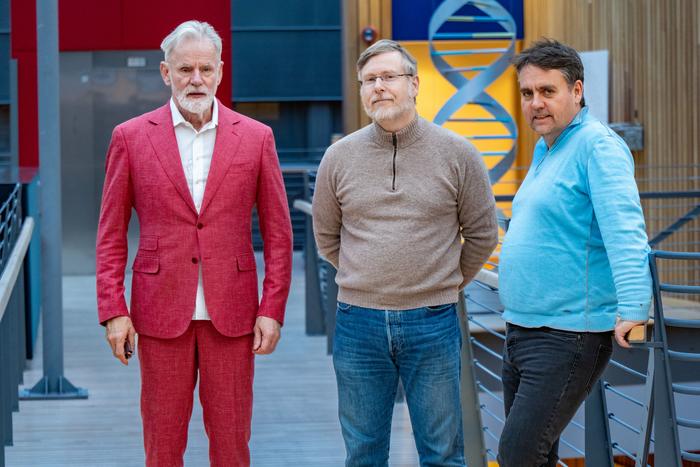In a groundbreaking study that sheds light on the intricate process of genetic recombination, scientists at deCODE genetics/Amgen have unveiled a comprehensive map detailing the mechanisms of human DNA mixing during reproduction. This map, published in the prestigious journal Nature, represents a significant leap in our understanding of genetic diversity, offering profound implications for health and fertility.
The research, which builds on over 25 years of rigorous investigations by the deCODE team, emphasizes the role of these recombination processes in shaping the human genome. Recombination is a fundamental biological phenomenon through which genetic material is shuffled and inherited, contributing to genetic diversity among individuals. The new insights gained from this extensive mapping endeavor provide a clearer understanding of how genetic variations can influence health outcomes and disease susceptibility.
One of the innovative aspects of this research lies in its focus on the granularity of genetic shuffling. The researchers incorporated the shorter-scale, non-crossover recombination events that occur during the mixing of grandparental DNA, a process historically difficult to track due to the high degree of genetic similarity. This refinement allows for a more nuanced view of how DNA is reshuffled and inherited across generations, revealing critical information about genomic regions that undergo minimal reshuffling and, consequently, are highly conserved.
Understanding these areas is essential, as they play a protective role in safeguarding vital genetic functions. The findings suggest that certain segments of DNA are preserved through evolutionary pressures to maintain stability, thereby significantly reducing the likelihood of chromosomal anomalies. This knowledge is invaluable, as it informs our understanding of reproductive challenges, including the underlying causes of pregnancy failures and complications.
The implications of irregularities in the recombination process are particularly concerning, as they can lead to severely compromised reproductive outcomes. Infertility is a prevalent issue, affecting one in ten couples globally, and understanding the genetic mechanisms at play offers a pathway toward improving fertility treatments. The data from this study will support the development of advanced diagnostic tools aimed at identifying genetic errors early in pregnancy, ultimately assisting clinicians in providing better patient care.
Furthermore, the research highlights notable sex-based differences in recombination patterns, which have implications for understanding reproductive health. While women demonstrate a lower frequency of non-crossover recombination events, the frequency of these events rises with maternal age. This observation could explain the increased incidence of pregnancy complications and chromosomal disorders among older women, thereby illuminating a critical aspect of maternal health that requires further exploration.
Men, on the other hand, do not exhibit the same age-related changes in recombination frequency. Both sexes contribute to the mutations passed down to their offspring through recombination, but understanding the variances in recombination patterns assists researchers in elucidating how parents influence the genetic landscape of their children. Such insights are vital in deciphering the complexities of hereditary diseases and individual health profiles.
The comprehensive human recombination maps crafted through this research project not only enhance our understanding of genetic diversity but also provide a framework for studying human evolution. The intricate balance between genetic diversity and genomic stability permits a deeper examination of what drives individual variability in health and disease. By mapping out the regions where recombination and de novo mutations are prevalent, researchers can infer how these forces interact to produce unique genetic architectures in populations.
Additionally, the study sheds light on the evolutionary significance of genetic recombination. All human genetic diversity can be traced back to recombination events and newly arisen mutations that emerge in the offspring but are absent in the parents. The correlation between mutations and regions of active DNA mixing illustrates the dynamic nature of the genome, rendering it susceptible to variations that can have a profound impact on the species as a whole.
Amid the confluence of reproductive health challenges and evolutionary biology, this research stands as a beacon of hope. By illuminating the mechanisms behind genetic diversity and its ramifications for health outcomes, the findings may guide future research aimed at better understanding complex diseases, refining diagnostic tools, and developing personalized medical interventions.
The implications of this study extend beyond reproductive medicine. As our understanding of human genetics continues to evolve, it opens doors to exploring a multitude of avenues in biomedicine, including exploring genetic risk factors linked to various diseases. The knowledge generated through this comprehensive mapping equips us with the tools necessary to address significant public health concerns and fortify our efforts in disease prevention.
In conclusion, this landmark research by deCODE genetics/Amgen heralds a new era in human genetics, underscoring the necessity of understanding the intricate pathways through which DNA is recombined and inherited. The complete human recombination maps not only enrich the scientific community’s comprehension of genetics but also possess the potential to revolutionize the fields of reproductive health and personalized medicine.
Subject of Research: Genetic Diversity
Article Title: Complete Human Recombination Maps
News Publication Date: 22-Jan-2025
Web References: http://dx.doi.org/10.1038/s41586-024-08450-5
References: Nature Journal
Image Credits: deCODE genetics
Keywords: Genetic diversity, recombination, DNA mapping, fertility, health outcomes, infertility, genomic stability, evolutionary biology.





